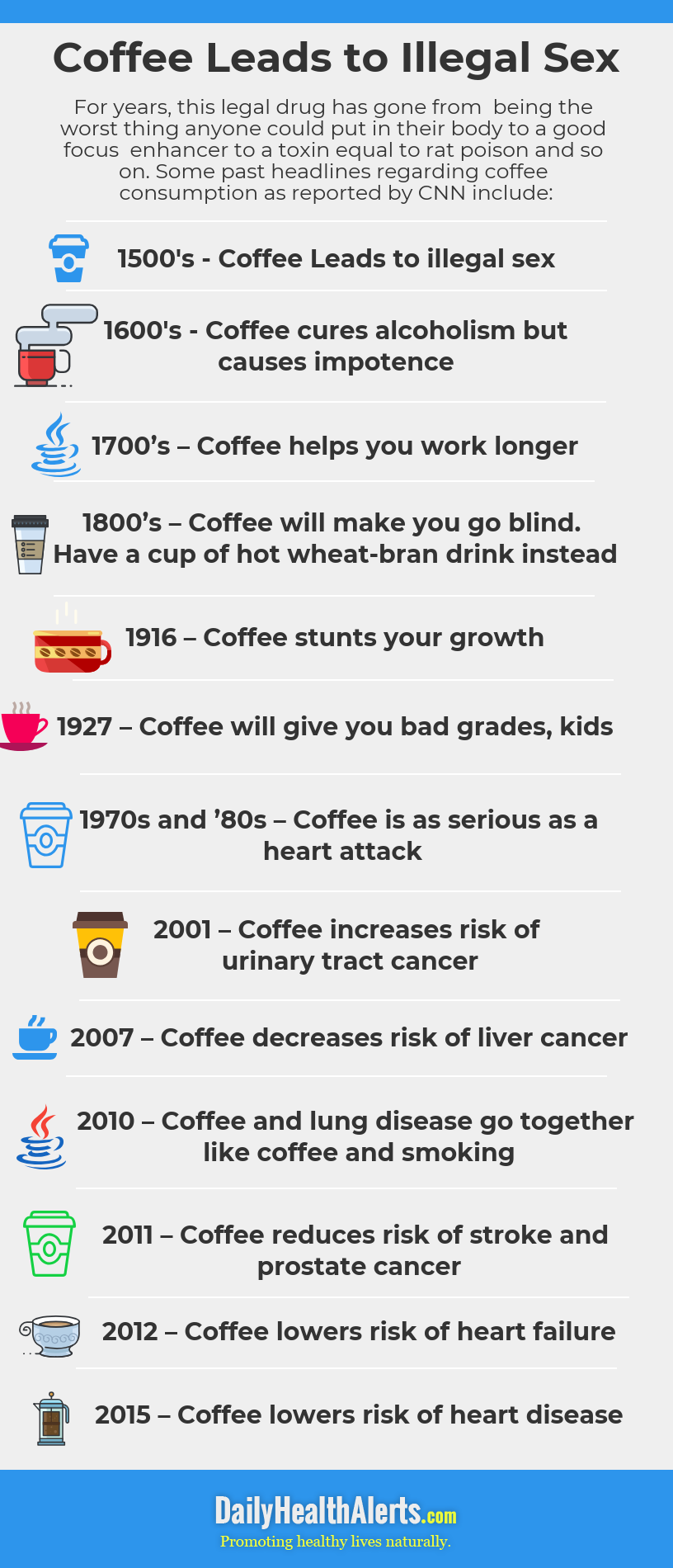These days you could pretty much throw a rock in any direction and hit a coffee shop. It is usually delivered as a corporate coffee experience that seems to pop up every few blocks; the trendy, specially roasted free wifi cafe; or the overpriced elite coffee joint with beans harvested from the base of a remote volcano.
Either way, coffee is a lucrative beverage. It is also highly addicting with even trace amounts of caffeine in decaf. For years, this legal drug has gone from being the worst thing anyone could put in their body to a good focus enhancer to a toxin equal to rat poison and so on.
Some past headlines regarding coffee consumption as reported by CNN include:
1500’s – Coffee leads to illegal sex
1600’s – Coffee cures alcoholism but causes impotence
1700’s – Coffee helps you work longer
1800’s – Coffee will make you go blind. Have a cup of hot wheat-bran drink instead
1916 – Coffee stunts your growth
1927 – Coffee will give you bad grades, kids
1970s and ’80s – Coffee is as serious as a heart attack
2001 – Coffee increases risk of urinary tract cancer
2007 – Coffee decreases risk of liver cancer
2010 – Coffee and lung disease go together like coffee and smoking
2011 – Coffee reduces risk of stroke and prostate cancer
2012 – Coffee lowers risk of heart failure
2015 – Coffee lowers risk of heart disease
This year’s headline is that coffee is on the upswing again with a recent study touting the surprisingly significant health benefits of coffee when it comes to mortality.

Goats Don’t Lie
It is said that coffee was discovered by a sheep herder named Kaldi when he discovered that his sheep displayed high energy after eating berries from a certain tree. So much so that they didn’t want to sleep ate night.
When Kaldi reported his discovery to the local monastery abbott, the abbott took it upon himself to drink the soaked berries. His reaction was reported staying alert and focused during prayer. From this discovery, the berries quickly became popular enough to trade throughout continents making it one of the largest commodities on the planet today.
The Kick
Thomas Jefferson said, “Coffee, the favorite drink of the civilized world”.
It was found that after drinking beer for so long as a common beverage, when caffeine arrived it enabled Europeans to finally get things done. This, of course, was due to the stimulating effects of the key component in coffee, caffeine.
Caffeine works on several different levels such as:
The list of more “good” caffeine results as opposed to many speculated “bad” assumptions has lead to continued studies of this natural high.
Science Says You May Live Longer
The most recent study of the effect of coffee on the human body comes out of published research (8/6/18) by the UK Biobank in JAMA (Journal of the American Medical Association).
The study investigated the question,
“Moderate coffee consumption has been inversely associated with mortality; however, does heavy intake, particularly among those with common genetic polymorphisms that impair caffeine metabolism, increase risk of mortality?”
This was a large prospective cohort study between 2006 and ending in 2016 with upwards of 500,000 participants from North America, Europe, and Asia interviewed. Each participant, most in their 50’s but ranging between 38-73 years old, drank between 1 and 8 cups of coffee per day.
The study concluded that,
“Coffee drinking was inversely associated with mortality, including among those drinking 8 or more cups per day and those with genetic polymorphisms indicating slower or faster caffeine metabolism. These findings suggest the importance of non-caffeine constituents in the coffee-mortality association and provide further reassurance that coffee drinking can be a part of a healthy diet.”
The interesting thing about this research is that it didn’t matter whether people drank multiple cups of coffee per day nor did it matter if it was mixed with milk, sugar, or was even decaffeinated. Overall, the results estimated that daily coffee drinkers were 10 to 15 percent less likely to die than those who abstained from the popular beverage.
For now, keep drinking your coffee until the next headline steers you in another direction. However, don’t rely on this brown jet fuel in lieu of a healthy diet and exercise protocol and be careful how many calories you pour into your concoction. Coffee has a high antioxidant level but if tamped down by fats and sugars, the beneficial effects may be reversed.